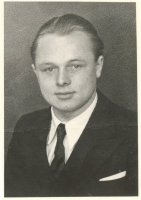
Eugeniusz Tyrajski,
born on the 8th of October 1926
Home Army soldier
pseud. "Genek," "Sek"(= a snag)
K-2 company, "Karpaty" battalion
"Baszta" AK regiment
The insurgent relations of witnesses
The war memories of Eugeniusz Tyrajski - a soldier from "Baszta" -(= a tower)
German peregrination
 |
|
In Pruszkow we were just few hours. There was a temporary camp Durchganglager. People stayed there some days at best. Warsaw people coming in in large numbers were divided into three groups: women, men at the age of 15-50 then the elderly and mothers with children. I said to friends: "Boys, where will we end up? It won't be good with those men." At best we'll end up in a labour camp. One should do a bunk. But how?
One should get somehow to the women's column where we spotted our women-liaison officers. The distance between columns, about every 15-20 metres, there are standing Ukrainian security guards. We are signalling our friends what we are going to do and are waiting for the further situation development. In one moment one of the Ukrainians starts going along the column in the direction of the camp exit gate. At some time, one of our women-liaison officers "Kaja", a very clever girl, jumps up to another security guard and starts asking him. She stood in such a way that the security guard was standing with his back to us. In that way none of them can see us.
It was that moment. Please, believe me we flitted about that 20-25 metres among the columns. The world record is a youth in comparison with our result. We found ourselves among women nobody had noticed our manoeuvre. The transport of women in a moment will be put into the carriages. From a distance we can see that Germans from time to time catch individual men from the women's column. It's not good. Each from the three of us melted into one of the remote four. But it doesn't look good.
Suddenly, by me, I can see a girl whose face is familiar to me. She says to me: "We probably know each other." In reality, this is my friend from school- Teresa. Together we had attended before the war the same public school nr29 at Zagorna Street. During the whole war and the Uprising we didn't meet each other. Only now the Fate brought us together. I can see, Teresa has lacerated legs. I am linking my arm through hers, and am helping her go. We are getting closer and closer to the carriages. Suddenly a heavy downpour starts. Streams of water are flowing from the sky. Everyone is flinging on themselves anything they have. I am covering myself and Teresa with something. Germans wet soaked in thin little uniforms don't pay attention to people going in columns to carriages. "Schneller, schneller!" In a moment the three us together with women we found ourselves in the carriages. Me in one car, friends in the next ones. Behind me Teresa and some our nurses and women-liaison officers from Sadyba. After the carriage shutting and after some hours of a stopover we set off into the unknown.
The journey was long. As it turned out later on we were directed to Auschwitz. Auschwitz didn't admit us as it was overflowing with people from Warsaw Old Town. In this regard we were directed somewhere else. After two days and nights of travelling and frequent stopovers we got to a temporary camp in Bossen near Frankfurt on the Oder. Here our transport was partly unloaded. The rest of carriages was directed to the labour camp in Flossenburg. In Bossen there was about 1,5 thousand of women and 15 or maybe 20 men. Fortunately nobody had been interested yet in this of how in such a mass of women some men had got there.
In Bossen we stayed for some days. During the trip to Pruszkow I made friends with Teresa. We decided to stick together. I started living by my wits in order to get some dressing for her lacerated legs. Germans were organizing the transported. The documents were issued, questions about a profession were put and they directed to work. I didn't confess I had a Kennkarte on me. I got a new ID. As I learnt Germans didn't separate marriages, we decided with Teresa to pretend that we'd been married. There was a problematic fact that we were very young (both of us we were 18 years old).In this regard I added to my age two years. I said to Teresa she should practise my surname and a sign indispensable on a new document.
We wondered what profession we should give. We didn't want to land in the factory (of bombs), for the field we weren't fit too. We decided we would pass ourselves off as gardeners. I said that I graduated from a gardening school while Teresa stated her parents had had an allotment. The latter was even true, but me myself I didn't have the foggiest idea about that profession.
After some days we were transported to Storkow place, where on the slave market we were chosen by one of the local gardeners. His parents knew Polish about which unfortunately I didn't know. For some times during a conversation with Teresa I took the liberty of stating some favourable opinions about Germans what caused soon this that we parted with Mister gardener. We were sold by him to Mr. Richard Schulze, an owner of a shipping company Internationale Transporte. He was a party member figure, Mr. Schulze had NSDAP part card of a 23 number.
I was employed in the capacity of a driver assistant and my "wife" of Mr. Schulze's wife housemaid. I could have been even a driver, but because I didn't have a driving licence and Germans were very law-abiding my function limited to the assistant. The car I drove was led by a one-handed invalid from the east front. The vehicle was powered by Holzgas. At the back on the lorry trailer there was installed a special stove into which chopped pieces of wood were put. As a result of burning wood gas was produced that fed the car engine. My role came down to the wood fuel delivery. Not long ago American planes bombarded by mistake a nearby forest so trees for processing them into firewood didn't lack.
The Schulzes lived in a holiday little house in Prieros place on the beautiful lake. They preferred to live there than in Berlin, where constant air raids happened. Me and Teresa we were alloted a holiday chalet on the other lake side: one room where a stove was put; it was a stove of the "pot-bellied" kind for two lids. It had been already October and it was getting colder and colder. In the chalet the temperature was like the temperature outside, the pot-bellied stove didn't help much. Then the winter started. The frost was getting on for 20-30 degrees. We covered ourselves at night with everything possible. Fortunately the owner liked Teresa and gave all heaps of sheets to her. We slept on mattresses, duvets etc. on the heads we had earmuffs.
The worst thing was to maintain the hygiene. My further wife could wash herself during work at German's woman house. I was solely doomed to the lake. In the morning I jumped out from our little house with an axe in the palm of my hand ran to my "regular" blowhole, I hacked newly frozen ice and tried to wash myself somehow. They were very strong sensations. I was even well-paid for the job by the German. A good knowledge of German was useful to me. Here a tribute paid to my father who had appreciated the value of foreign language knowledge. In 1939 just after September father started sending me for private lessons! The acquaintance of two west languages was considerably useful in not a short time.
In the meantime the Russian front was approaching. It had already reached Oder River. On the 14th of February 1945 "Kordian" from the K-2 company came to me, one of our Pruszkow three. He was employed as a gardener in the place Lebus on the Oder. Because the front had already been on the river the owners just drove us out to the west. We decided not to wait for the liberation by the "Russkis." We knew what they did with Home Army people on the liberated areas. We decided to escape westwards. Young people make quick decisions. Adam came during the day, in the evening we were talking about the escape. I knew that a bus to the nearby Königswusterhausen departed from Prieros at 4 in the morning. From there one could get by train to Berlin and further.
The decision was taken. At night of 15 and 16 February 1945 we moved westwards. First stealthily to the bus in Prieros. We didn't meet any known German. It went smoothly, we didn't have considerable luggage. The key of the chalet house we threw in the snow, it would be visible in the spring. In Königswusterhausen at the train station crowds of escapees from the east. In a general mess there is no problem with obtaining a certificate that we were Fluchtlinge (fugitives) from the front and we are heading westwards. Without such a certificate one cannot go even one stop. The office worker was in a hurry: "Quick, quick, name, surname, name, surname." In a moment the passes were ready. Nothing else could we wish for.
In Berlin we got on the train and on the 17th of February we were in Lipsk. We decided to get to Bavaria and from there through the Alps to Switzerland. We had money, we knew German quite well. We had never had on our clothes the "P" badge and so we didn't stick out. The train transfers were relatively cheap, we had ration cards. The controls were dealth with without any problem with a certificate that we were "Fluchtlinge." You had to be 18 to hit upon such an idea.
A little diary was preserved by me where I put down meticulously another dates and places. Berlin, Zossen, Wittenberg, Leipzig, Hof, Regensburg. Availing ourselves of the opportunity to be there we decided to visit a popular Regensburg Cathedral, and then Munich. When visiting the cathedral in Regensburg we left the luggage under the bench at the station. Germans behaved decently and nothing got lost from the luggage left behind.
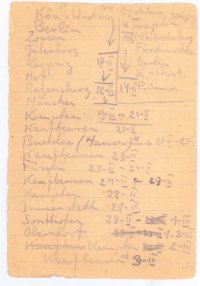
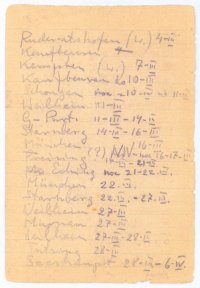
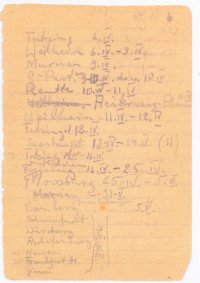
The diary on travel through Germany
On the 19th of February we got from Munich to Kempten. Every now and then it was getting closer to the Swiss border. We were worried with more and more frequent controls. We were asked why we weren't going to Arbeitsamt in order to get a job. We decided to stop and rest a while. On the 21st of February we reported to Arbeitsamt in Kaufbeuren and got a request to the bauer in Hausen Place. We withstood it for 2 days, it wasn't a job for us. We did a bunk and moved to Füssen. It had been the Alps already. The Swiss border in our grasp.
On the 28th of February we got to Sonthofen place. We decided to stay overnight in a some boarding house. We passed ourselves off as Czechs evacuated westwards. Germans treated Czechs much better than Poles. We were waiting in a huge dining room for the room allotment. And here a nonsensical unmasking. In the second end of the hall there is sitting a German officer in a woman's company. Hearing our casual, but not very loud, conversation he comes up to us and asks in a pure Polish language where we are from. A complete surprise. Vaguely we are explaining something to the officer. He called the woman-owner of the boarding house, said we were Poles not Czechs and as it was a suspicious case the police had to be called.
The owner telephoned somewhere. It turned out the police had to arrive from the neighbouring place. We decided to escape. The German was probably a convalescent, as he was quite sluggish. He and two German women were unable to stop us. We had a map on us. On its basis we knew that in the opposite direction to the police station from a distance of a few kilometres there was a little town Oberstdorf. One could reach it partly across the mountains. It was a slightly mad idea, but we hoped it wouldn't cross Germans's minds we had chosen such a solution.
One part of the night we spent on a some hall in an empty shelter. We were shaking with cold. It was February after all. In the mountains!!! In the morning we reached happily Oberstdorf. We travelled, I think, about 10km of the mountain region. We just took a glance on the ski jumps and from here we travelled by train to Kempten. We decided to change the direction. Through Kaufbeuren and Weilheim we got to Garmisch Partenkirchen. Brought up almost on the Legion stadium I couldn't lose the chance of visiting a place where the last winter Olympics in 1936 happened. I had to see the ski jumps at least.
We are hanging around the neighbourhood. We got back to Starnberg. It was a half of March, a beautiful spring had been starting at the foot of the Alps. We landed on the amazing Starnbergersee lake. We stayed overnight in a some desolate shed on the hill. One month of our wander had been already passing by. Any attempts of getting through to Switzerland we resigned from long time ago. The borderland was heavily manned, the risk was too high. We had problems with washing ourselves, and washing anything. Our old certificate from Königswusterhausen started raising doubts. We decided to stay up somewhere at Germans', have some good nights sleep, wash ourselves thoroughly and wash things off. From the 28th of March to the 6th of April we stayed in Seeshaupt located on the Starnbergersee lake as well. We spent our time at a local, hospitable gardener as if we had worked for him. We spent with him Easter time that was very justly celebrated in the catholic Bavaria. After some days we had to part with a hospitable host. Nosey neighbours became interested in our presence.
Again we were in Tutzing and Weilheim. On the 9th of April 1945 after staying in Murnau, where a prisoner camp for Polish officers was located we landed again in Garmisch Partenkirchen. On the 10th of April we were stopped on the train station by a police patrol. This time together with "Kordian" we showed our original Kennkarten that had survived after the Uprising. The documents given in Bossen we had left in Arbeitsamt in Kaufbeuren. They urgently wanted to employ us in the ammunition factory, what didn't suit us completely. Because we had original documents from Warsaw we didn't worry too much about the loss of those later given.
Germans pondered very long over our Kennkarten. Finally they decided to take us for the police station to explain some problem. Teresa, that had a German certificate, didn't have to show anything. The statement she was my Frau-wife was enough. So she stayed on the station looking after our miserable luggage: two bags and Adam's suitcase. We both, as it turned out, were taken by the patrol to Gestapo or maybe Kriminalpolizei. We were led into a room where a some civvy was sitting. A many-hour conversation started.
We were ordered to fill in a document something like a form for personal particulars. And here the whole fun started. As I had earlier mentioned I was born in a little town Nowe Brwilno in Gostynin region. Those regions after the war break-up were incorporated into the Reich, so in the place of birth Deutschland was written. In the form there was a space for the name of nationality. I put there "Generalgouvernement" a German jumped up to me yelling: "Aber das ist doch Keine Nationalitat!" (it's not a nationality at all). I played dumb: "Ich weiss nich, Ich bin aus Generalgouvernement" (I don't know what's going on I'm from General-Gouvernement). Fortunately there was no space for nationality in the Kennkarte where one would find the entry: "Pole." And I remembered very well the slogan"... fur Juden, Polen und Hunden, Eintritt verboten..." (For Jews, Poles and dogs there is no admittance).
In one moment I hit upon a reckless idea. I said to the civvy: "So we are running away from Bolsheviks to be looked after Germans and here there is no job available, no place to stay overnight we even have to explain something. The German got confused. He left the room. We stayed alone inside. Adam said to me: "So you stirred up trouble. After half an hour the civvy with a uniformed policeman came back and said to us: "There is an order in Germany. This man (he showed the policeman) will escort you to Arbeitsamt and you'll get a job." Now I got confused in turn, I couldn't get up from the chair. We were convinced that they would lock us up at best so as to look into the case more thoroughly. I worried about Teresa.
Three of us, together, we went out on the street. A good mood returned instantly. Certainly I'll think something up. We went slowly to Arbeitsamt about one kilometre away. The weather was beautiful, sun was shining, amazing mountains around. We asked the German if he'd lived there all his life and what the names of the nearby peaks were. We almost made friends. Having reached Arbeitsamt I thanked the policeman for showing the road and said that we would manage on our own then and I shook his hand. The German got confused and we calmly got inside. Through the window we were observing what the escorting policeman was doing. He stood there some minutes, then he waved the hand and walked away.
We rushed to the station for Teresa. It turned out that Teresa worried with our long absence she had gone to look for us. Although her knowledge of German was poor she learnt we went to the Labour Office. So she got back to the station and waited calmly for us. Of course we left Garmisch Partenkirchen by the very first train. Evading all possible controls we withdrew from the near-Alps region. On the 16th of April in 1945 we landed in Freising located 40km east of a totally ruined Munich. Some days we lived there in a house for fugitives from the east front. We managed there somehow to weasel out our documents.
Here we went through a carpet-bombing of American super-fortresses. Hearing the alarm sirens we made off from the restaurant where we had been just eating dinner, to the town outskirts on the little Isar river. On that little 20-30-thousand town fell bombs from two flights, 64 super-fortresses each (I counted). The bomb fire destroyed completely the little town. Houses changed into one ocean of ruins. In a little park in front of the train station the bomb craters literally overlapped one another. Everywhere human body remains were scattered around.
From the Poles working in the forced labour in the neighbourhood we learnt that in the distance of 17km east of Freising, on the border of a not very big town Moosburg there was a prisoner camp, where, one among others, stayed several hundred Poles - soldiers from the Warsaw Uprising. Probably it would be possible to contact with them as they leave the area to dig out the potatoes from the storage clamps for the camp. So we rushed into that direction. On the road we were almost shot by an American fighter that had formally launched a hunt for us. Somehow, jumping from one road side to the other road side, from one ditch to another, we managed to avoid the shooting. In vain were we waving handkerchiefs to them, the pilot was stubborn. Finally he gave up.
Midway, passing a not very big town, behind the fence we heard a beautiful bunch of "Polish flowers." Thinking not too long I opened the wicket...and the first face I saw was the face of my mate from K-2 from the Uprising Jurek Kisielinski pseud. "Dyszel," (= a shaft; a pole; a two bar).Then I saw two another friends. A warm greeting ensued. We talked about our adventures. "Dyszel" said with some pals he looked after a better camp supply, trading with Germans while others were digging out potatoes, he bought butter, eggs and fresh food products for coffee and cigarettes from the Red Cross food parcels.
"Dylo" proposed that the three of us should stay overnight at a known Polish woman that was working in the forced labour in Moosburg. Next day they'll bring uniforms to us...and together with a coming back group we'll enter the camp area. And indeed the next day at 4 in the afternoon we went into the camp. Germans hadn't counted then the coming back Germans yet. The camp was enormous, there were several hundred thousand of prisoners. Its part for the insurgents was in principle behind the main area of the camp. There were tents put up in which we were staying as well.
Living conditions were quite good. The war was nearing its end. In Moosburg there was a main magazine of the Red Cross parcels for the whole Bavaria. Because the camp kitchen didn't work in practice, Germans gave one parcel to every single prisoner every second day. It allowed us to complete the food products at local Germans for coffee and cigarettes. Finally we could have a good sleep, we could wash ourselves thoroughly and we could eat our fill.
In the camp, by "Dylo"'s testimony, we were verified by the intermediary of the Polish group of prisoners, Sergeant Janusz Ragus, pseud. "Wicher'" (= a gale). From that moment we started feeling full war prisoners. Of course we weren't put on the German register of war prisoners. We were probably the only war prisoners that hadn't escaped, but landed in the camp by ourselves. Just like strange circumstances connected with giving the Kennkarte caused some strange events during our wandering through Germany this fact in turn brought about some definite repercussions after my return to the country.
On the 29th of April 1945 soldiers of the III American Army of General Patton liberated Stalag VII A in Moosburg. It happened after a three-hour shooting of the town by Americans from where the last German soldier had withdrawn the day before. As a result of this shooting one of my campmates got hurt, but fortunately not seriously. As a material evidence confirming the date of liberation from the camp I preserved an autograph of an American soldier who had entered the camp area as the first one dated to the 29th of April 1945.
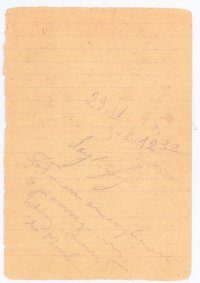
The American soldier's autograph
This way I was liberated by Americans as a war prisoner. Being in no German register I found myself as a prisoner in the Polish register and this way I was treated by the Polish authorities on the west. Probably this is the only case in the history of the Second World War.
Eugeniusz Tyrajski
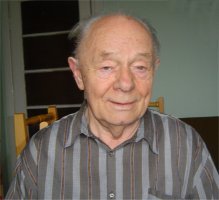
|
Eugeniusz Tyrajski, born on the 8th of October 1926 Home Army soldier pseud. "Genek," "Sek"(= a snag) K-2 company, "Karpaty" battalion "Baszta" AK regiment |
elaboration: Maciej Janaszek-Seydlitz Copyright © 2011 Maciej Janaszek-Seydlitz. All rights reserved.
translation: Ma³gorzata Szyszkowska